 Полная версия
Полная версияRollo in London
"I shall have to give it up," said he to himself. "If it was a pleasant day, I could go by the sun; for by keeping to the south I should, sooner or later, come to the river."
Unfortunately for Rollo, as is usually the case in London, the sun was not to be seen. The sky was obscured with an impenetrable veil of smoke and vapor.
"I'll take a cab," said Rollo, "at the first stand, and tell the cabman to drive me to Northumberland Court. He must find where it is the best way he can."
Rollo put his hands in his pockets as he said this, and found, to his consternation, that he had no money. He had left his purse in the pocket of another suit of clothes at home. He immediately decided that he must give up the plan of taking a cab, since he had no money to pay for it. This difficulty, however, was, in fact, by no means insuperable, as he might have taken a cab, and paid the fare when he arrived at his lodgings, by asking the man to wait at the door while he went up to get his purse. He did not, however, think of this plan, but decided at once that he must find some other way of getting home than by taking a cab.
"I will ask a policeman," said he.
So he began to look about for a policeman; and as there are so many thousands of them on duty in London, one can almost always be very readily found; and, when found, he is instantly known by his uniform.
Rollo met the policeman walking towards him on the sidewalk.
"I want to find my way to Northumberland Court," said he. "Will you be good enough to tell me which way to go?"
The policeman looked at Rollo a moment with a kind and friendly expression of countenance.
"Why, it is two miles and a half from here," said he, "at least, and a very difficult way to find. I think you had better take a cab."
"But I have not any money," said Rollo.
The policeman looked at Rollo again with as near an approach to an expression of surprise on his countenance as it is possible for a policeman to manifest, since it is a part of his professional duty never to be surprised at anything or thrown off his guard. Rollo was, however, so well dressed, and was so gentlemanly in his air and bearing, that almost any one would have wondered a little to hear him say that he had no money.
"I accidentally left my money all at home," said Rollo, by way of explanation.
"Very well," said the policeman; "come with me."
So Rollo and the policeman walked along together. As they walked they fell into conversation, and Rollo told the policeman who he was, and how he came to lose his way. The policeman was very much interested when he heard that his young friend was an American; and he asked him a great many questions about New York and Boston. He said he had a brother in Boston, and another in Cincinnati.
After walking the distance of two or three blocks, the policeman said,–
"This is the end of my beat. I must now put you in charge of another officer."
So saying, he made a signal to another policeman, who was on the opposite sidewalk, and then going up to him with Rollo, he said,–
"This young gentleman wishes to go to Northumberland Court. Pass him along. He is from America."
So Rollo walked with the second policeman to the end of his beat, talking with him all the way about America and about what he had seen in London. At the end of the second policeman's beat Rollo was placed in the charge of a third policeman; and thus he was conducted all the way, until he came in sight of Charing Cross by a succession of policemen, without ever making it necessary for any one of them to leave his beat. As soon as Charing Cross came into view, with the tall Nelson monument, in Trafalgar Square, to mark it, Rollo at once knew where he was. So he told the policeman who had him in charge there that he could go the rest of the way alone; and so, thanking him for his kindness and bidding him good by, he ran gayly home.
Thus the policemen are, in many ways, the stranger's friends. They are to be found every where; and they are always ready to render any service which the passenger may require of them. Each one is furnished with a baton, which is his badge of office; a rattle, with which he calls other policemen to his aid when he requires them; a lantern for the night; and an oilskin cape for rainy weather. In winter, too, they have greatcoats, made in a peculiar fashion.
But to return to the Horse Guards. After Mr. George had finished his conversation with the policeman about the Horse Guards, he said to Rollo that he was going over to the other side of the street, in order to get a better view of the building. So he led the way, and Rollo followed him. When they reached the opposite sidewalk, Mr. George took his station on the margin of it, and began to survey the edifice on the opposite side of the street with great apparent interest.
"I don't see any thing very remarkable about it," said Rollo.
"It is the head quarters of the British army," said Mr. George.
"What elegant black horses those troopers are upon!" said Rollo.
"It is the centre of a power," said Mr. George, talking, apparently, to himself, "that is felt in every quarter of the world."
"I should like to have such a uniform as that," said Rollo, "and to be mounted on such a horse; but then, I should rather ride about the city than to stand still all the time in one of those sentry boxes."
"About the town, you mean," said Mr. George.
Rollo here observed that there was an open gateway in front of the Horse Guards, and beyond it an arched passage, leading directly through the centre of the building to some place in the rear of it. There were a great many people coming and going through this passage way; so many, in fact, as to make it evident that it was a public thoroughfare. Rollo asked his uncle George where that passage way led to.
"It leads to the rear of the Horse Guards," said Mr. George, "where there is a great parade ground, and through the parade ground to Hyde Park. I have studied it out on the map."
"Let us go through and see the parade ground," said Rollo.
"No," said Mr. George, "not now. We had better go some morning when the troops are parading there. We must go now and look out our lodgings."
So Mr. George and Rollo walked on, and about half an hour afterwards Mr. George engaged lodgings in a place near the junction of the Strand with Charing Cross, called Northumberland Court.
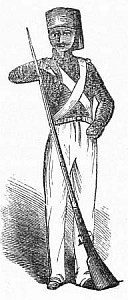
Chapter V.
Lodgings
The whole system of providing for travellers at hotels and lodging houses in England is entirely different from the one adopted in America. In America all persons, in respect to the rights and privileges which they enjoy, are, in theory, on a footing of perfect equality; and thus, in all public resorts, such as hotels, boarding houses, public places of amusement, and travelling conveyances, all classes mingle together freely and without reserve. At the hotels and boarding houses, they breakfast, dine, and sup together at the public tables; and even if they have private parlors of their own, they do not, ordinarily, confine themselves to them, but often seek society and amusement in the public drawing rooms. At the places of amusement and in the public conveyances they all pay the same price, and are entitled to the same privileges, and they only get the best seats when they come early to secure them. This, in America, is the general rule; though of course there are many exceptions, especially in the great cities. In England it is altogether different. There society is divided into a great many different ranks and degrees, the people of each of which keep themselves entirely separate and distinct from all the others. The cars of the railway trains are divided into four or five classes, and travellers take one or the other of them, according to their wealth or their rank, and pay accordingly. In the hotels and lodging houses every arrangement is made to keep each guest or party of guests as separate as possible from all the rest. There are no public tables or public drawing rooms. Each party, on its arrival at the hotel, takes a suit of rooms, consisting, at least, of a sitting room and bed room, and every thing that they require is served to them separately there, just as if there were no other guests in the house. It is the same with the boarding houses, or lodging houses as they are commonly called. Each boarder has his own apartment, and whatever he calls for is sent to him there. He pays so much a day for his room or rooms, and then for his board he is charged for every separate article that he orders; so that, so far as he takes his meals away from his lodgings, either by breakfasting or dining, or taking tea at the houses of friends, or at public coffee rooms, he has nothing to pay at his lodging house excepting the rent of his rooms.
There are a great many of these lodging houses about London. They are found on all the side streets leading off from all the great thoroughfares. They are known, generally, by a little card in the window, with the words, "Furnished Apartments," written upon it. Mr. George and Rollo found lodgings, as was stated in the last chapter, in a house of this kind, situated in Northumberland Court.
Northumberland Court is so named from its being situated on a part of what were formerly the grounds of the town mansion of the famous dukes of Northumberland. I have already stated, some chapters back, that in former times the English nobles built magnificent houses on the great banks of the Thames, between the road called the Strand, which led from Westminster towards London, and the banks of the river. Since the days when these mansions were erected, the whole space around them, between the Strand and the river, has become completely filled with streets, squares, courts, and lanes, the names of which were often derived from those of the families on whose grounds they were built. The court where Mr. George and Rollo found their lodgings was called Northumberland Court for this reason. The entrance to it was under an archway a few steps beyond the great Northumberland House itself—a massive and venerable edifice, that is still standing. In fact, the Duke of Northumberland resides in it, when he is in town, to this day.
Mr. George and Rollo noticed the front of Northumberland House as they passed it, on the day when they were looking out for lodgings, as described in the last chapter, and, very soon coming to the archway which led into the court, they stopped to look in. There was a small iron gate across the entrance to the archway, but it was open.
"This is a cunning-looking place," said Mr. George; "let us look in."
So he and Rollo walked in under the archway.
"This is a snug place," said Rollo.
"Yes," said Mr. George; "this is just the place for us. We will look around and find the best house, and then knock at the door and look at the rooms."
So, after walking up and down the court once, Mr. George made his selection, and knocked at the door with a long double rap, such as is usually given by gentlemen.
Very soon a pleasant-looking servant girl opened the door. Mr. George told her that they had come to look at the rooms; whereupon the girl invited them to walk in, and led the way up stairs.
This conversation took place while they were going up stairs; and just as they reached the head of the stairs, Mr. George asked the girl what her name was. She said it was Margaret.
Mr. George said he wished to have a sitting room and bed room. He did not care, he said, if there were two bed rooms, if they were small. The girl said there was a sitting room and two bed rooms on the first floor, all connected together.
Margaret then led the way into the sitting room. It looked very snug and comfortable; though, compared with the bright and cheerful appearance of New York rooms, it had rather a dark and dingy appearance. The paper was dark, the paint was dark, and the furniture darker still. There was a sofa on one side of the room, and two or three comfortable arm chairs. There was a round table in the middle of the floor, and several other smaller tables in different places about the room. There was a sideboard, also, with a clock and various ornaments upon it. There was a mirror over the mantle shelf, and another between the windows; and various engravings, in frames that had evidently once been gilt, were hanging about the walls.
"Well," said Mr. George, as he looked about the room, "I don't know but that this will do for us, Rollo. What do you think?"
"I like it pretty well," said Rollo.
"Now let us see the bed rooms, Margaret," said Mr. George.
So Margaret led the way across the little entry to one of the bed rooms. The room had the same dingy appearance that had been observed in the sitting room, but it was abundantly furnished with every thing necessary for such an apartment. Margaret led the way through this bed room to a smaller one, which was so situated that it communicated both with the large bed room and the sitting room.
"Ah," said Mr. George, "this is just the place for you, Rollo."
"Yes," said Rollo; "I shall like it very much."
"What is the price of these three rooms?" said Mr. George, turning to Margaret.
"Twenty-seven shillings a week, sir, if you please," said Margaret.
"Twenty-seven shillings a week," said Mr. George, repeating the words to himself in a musing manner. "That must be about a dollar a day, reckoning four shillings to the dollar. Well, Rollo, I think you and I can afford to pay half a dollar a piece for our rooms, considering that it is London."
"Yes," said Rollo; "I think we can."
"We will take the rooms, then," said Mr. George, turning to Margaret.
"Very well, sir," said Margaret; "as you go down stairs I will speak to my mistress."
So Margaret led the way down stairs, and Mr. George and Rollo followed. At the foot of the stairs they were met by the landlady, who came out from a basement room to see them. Mr. George told the landlady that they would take the rooms; and he handed her his card, in order that she might know his name.
"And perhaps, sir," said she, "you would be willing to make a deposit in advance."
"Certainly," said Mr. George.
"Because sometimes," said the landlady, "a gentleman engages rooms, and then something happens to prevent his coming, and so we lose all our trouble of putting them in order for him, and, perhaps, lose the opportunity of renting them to another lodger besides."
"Certainly," said Mr. George. "It is perfectly right you should have a deposit. How much shall it be?"
"Perhaps you would be willing to leave five shillings with me," said the landlady; "that would be sufficient."
Mr. George expressed himself entirely satisfied with this arrangement, and, giving the landlady five shillings, he went away, saying that he and Rollo would return in the course of a couple of hours with their luggage. He then went out into the street, called a cab from off the stand in front of Morley's Hotel, drove down the Strand to the city, through the city to London Bridge, and over the bridge to the railway station. The porter brought out his luggage and put it upon the top of the cab; and then Mr. George and Rollo got in, and the cabman drove them back again to the West End. The luggage was carried up to their rooms; and thus our two travellers found themselves regularly installed in their London lodgings.
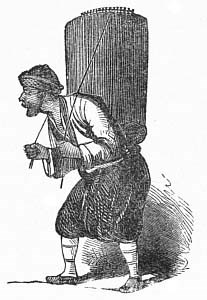
Chapter VI.
Breakfast
"Now, Rollo," said Mr. George, "ring the bell, and we will see what Margaret can let us have for breakfast."
It was Sunday morning, a day or two after Mr. George and Rollo arrived in London. Mr. George had been sitting at a small table at one of the windows, writing a letter, and Rollo had been sitting at the other window, amusing himself, sometimes by looking at the pictures in a book, and at others by watching the little scenes and incidents which were continually occurring at the doors of the houses on the opposite side of the court below.
In obedience to his uncle's request, Rollo pulled one of the bellropes which hung by the side of the fire. A minute or two afterwards Margaret's gentle tap was heard at the door.
"Come in," said Mr. George.
Margaret opened the door and came in.
"Well, Margaret," said Mr. George, "what can you let us have for breakfast this morning?"
"You can have whatever you like," said Margaret.
The English waiters and servant girls always say you can have whatever you like; but it does not always prove in the end that the promise can be realized.
"Can you let us have a fried sole?" asked Mr. George.
"Why, no, sir," said Margaret, "not Sunday morning. You see, sir, they don't bring round the soles Sunday morning."
"Muffins, then," said Mr. George.
"Nor muffins either," replied Margaret. "We can't get any muffins Sunday morning."
"Well," said Mr. George, "what can you get us most conveniently?"
"That's just as you like, sir," said Margaret. "You can have whatever you like."
"Why, no," said Mr. George; "for you just said we could not have soles or muffins."
"Well, sir," said Margaret, innocently, "that's because it is Sunday morning, and they don't bring round soles or muffins Sunday morning."
Mr. George began to perceive by this time that his principles of logic and those of Margaret were so entirely different from each other that there was no possibility of bringing any discussion to a point; and he very wisely gave up the contest, telling Margaret that she might let them have a cup of coffee, and any thing else she pleased.
"You can have a mutton chop, sir," said Margaret, "and rolls."
"Very well," said Mr. George; "that will be just the thing."
So Margaret went down to prepare the breakfast; and Mr. George, taking his seat on the sofa, began to turn over the leaves of his guide book, to see if he could find out what time the service commenced in Westminster Abbey.
"Uncle George!" said Rollo, "look here! See this strange-looking boy coming into the court!"
"How does he look?" asked Mr. George.
"He looks very poor," said Rollo, "and miserable, and his head is as big as a bushel basket! He is going to sing," Rollo added. "Hark!"
Mr. George listened, and heard the voice of a child, beginning to sing a plaintive ballad, in the court below.
"Come and see him," said Rollo.
"No," said Mr. George; "I don't wish to see him. You may throw him out a penny, if you choose."
"Well," said Rollo, "as soon as he has finished his song."
So Rollo waited till the boy had finished singing his song; and then, lifting up the window a little way, he threw a penny to him, shooting it out through the crack. Mr. George heard the chink of the penny as it fell upon the pavement below.
"He sees it!" said Rollo. "He is picking it up. He made me a bow!"
About this time Margaret came in and spread the cloth for breakfast. Soon afterwards she brought the breakfast up. She, however, brought only one cup for the coffee, having taken Mr. George's order, to let them have a cup of coffee, somewhat too literally. The truth is, that inasmuch as, at the English lodging houses, every thing that is called for is charged separately, the servants are, very properly, quite careful not to bring any thing unless it is distinctly ordered, lest they might seem to wish to force upon the traveller more than he desired to pay for.
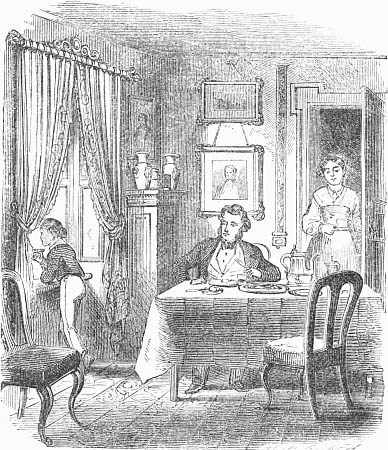
BREAKFAST.
Margaret was, however, it appears, a little uncertain in this case; for she asked Mr. George, as she put the waiter on the table, whether he meant to have two cups brought, or only one. He told her two; and so she went down and brought another, taking the coffee pot down with her, too, in order to add to it a fresh supply of coffee. In due time every thing was ready; and Mr. George and Rollo, drawing their chairs up to the table, had an excellent breakfast, all by themselves. Mr. George remained quietly in his seat at the table all the time while eating his breakfast; but Rollo was continually getting up and going to the window whenever he heard the footsteps of any one coming into the court or going out, or the sound of the knocker or of the bell at any of the opposite doors.
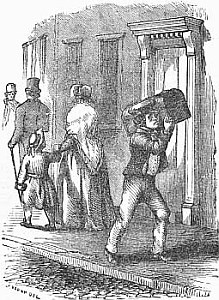
Chapter VII.
Westminster Abbey
"Now, Rollo," said Mr. George, after they had finished breakfast, "the great church of the city is St. Paul's, and that of the West End is Westminster Abbey. I have an idea of going to church this morning at the Abbey, and this afternoon at St. Paul's."
Rollo was well pleased with this arrangement; and soon afterwards he and his uncle sallied forth, and took their way along Whitehall.
Whitehall is a sort of continuation of the Strand, leading, as it does, along the Thames, at a little distance from the bank of the river. It is bordered on both sides by magnificent public edifices, such as the Horse Guards, the Admiralty, Westminster Hall, the Houses of Parliament, and the Treasury. Conspicuous among these and other similar edifices, and in the midst of paved courts and green gardens, stands the venerable group of buildings famed through all the world as Westminster Abbey.
Mr. George and Rollo, when they approached the abbey, saw a current of people moving towards the building. These people turned off from the sidewalk to a paved alley, which led along a sort of court. This court was bounded by a range of ordinary, but ancient-looking, houses on one side, and a very remarkable mass of richly-carved and ornamented Gothic architecture, which evidently pertained to the abbey, on the other. On the wall of the row of houses was a sign, on which were inscribed the words, "To the Poet's Corner."
"This must be the way," said Mr. George to Rollo.
So Mr. George and Rollo fell into the current, and walked up the alley. They came, at length, to a low-arched door in the wall of a building, which, from the massive stone buttresses that supported it, and the rich carvings and sculptures which were seen about the doors and windows, and the antique and timeworn appearance which was exhibited in every feature of it, was evidently a part of the abbey.
"This is the place," said Mr. George to Rollo, "there is no doubt."
Mr. George entered at the door, followed by Rollo, and they were ushered at once into a scene of the most extraordinary and impressive character. They found themselves in the midst of a splendid panorama of columns, statues, monuments, galleries, and ranges of arches and colonnades, which seemed to extend interminably in every direction, and to rise to so vast a height that the eye seemed to be lost in attempting to reach the groins and arches in which they terminated above. Here and there, at various places more or less remote, were to be seen windows of stained glass, through which beams of colored light streamed down through groups of columns, and over the carved and sculptured ornaments of screens and stalls, and among innumerable groups and figures of monumental marble.
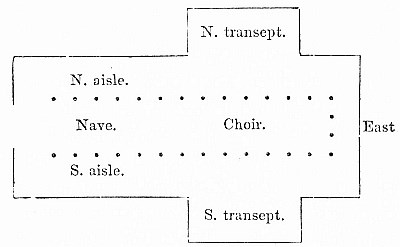
The place where Mr. George and Rollo entered the church was in the south transept, as it is called; that is, in the southern arm of the cross which is formed by the ground plan of the church.
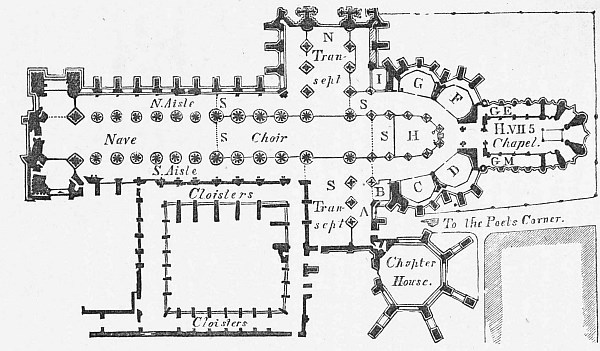
GROUND PLAN OF WESTMINSTER ABBEY.
Almost all the cathedral churches of Europe are built in the general form of a cross, the length of which lies always to the east and west.
The main body of the church is called the nave; the head of the cross is the chancel; the two arms are the north and south transepts; and the space formed by the intersection of the cross is called the choir. It is in the choir, usually, that congregations assemble and the service is performed, the whole church being usually too large for this purpose. The space necessary for the use of the congregations is separated from the rest of the floor by splendidly-carved and ornamented partitions, which rise to a height of twenty or thirty feet above the floor—the whole height of the church being often more than one hundred. These partitions are called screens. But in order that the reader may understand all this more perfectly, and also obtain a more full and correct idea of the interior of the abbey, I give, on the adjoining page, a ground plan of the edifice, which shows very distinctly its general form, and the relative position of the various parts of it above referred to. Near the margin of the drawing, on the right-hand side of it, is seen the passage way leading to the Poet's Corner, where Mr. George and Rollo came in. On the side which was upon their right hand as they came in you see the ground plan of the great buttresses which stand here against the wall of the church. On their left hand is the octagon-shaped building, called the Chapter House. This building was originally designed for the meetings of the body of ecclesiastics connected with the cathedral.3In the corner between the Chapter House and the church you can see the door opening into the church, where Mr. George and Rollo came in. On entering they found themselves at A, which is called the Poet's Corner, from the fact that the monuments of Shakspeare, Dryden, Thomson, Goldsmith, and most of the other poets that are interred or commemorated in the abbey, are placed here.

